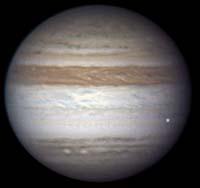Jupiter, again bombed

Researchers from the UPV Group of Planetary Sciences have published in the journal Astrophysical Journal Letters an article about the clash of a wax against the planet Jupiter. From this study it follows that falling objects a few meters above Jupiter is more frequent than previously thought, and is much more frequent than on Earth. In fact, the enormous gravity of Jupiter attracts with force the bodies of the solar system that pass near there, such as meteorites, comets, etc.
"We know that there are collisions in Jupiter, but it is the first time that the luminous glow produced by a shock on a planet in the solar system is seen from Earth," explains Jon Legarreta, researcher at the Planetary Sciences Group of the UPV. "It is important to know the details of the collision. On the one hand, to know how many small bodies roam the Solar System and, on the other, because the study and collection of these shocks help to better understand what can happen on Earth," added Legarreta.





